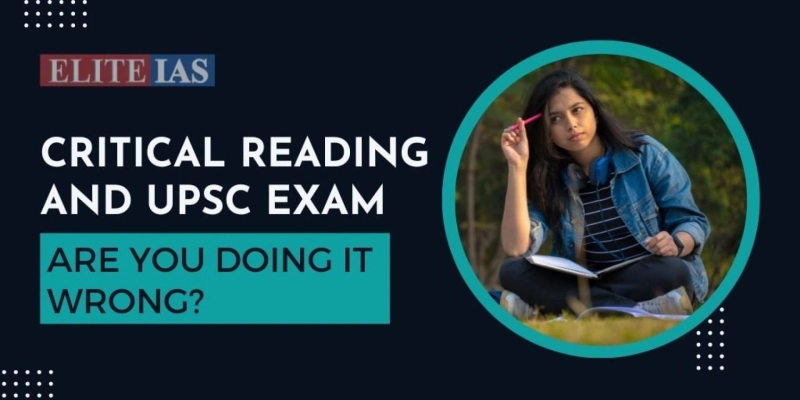Imagine a scene: A dedicated UPSC aspirant hunched over a pile of study materials, eyes scanning lines of text in a feverish attempt to absorb as much information as possible. This scenario is all too familiar to those who are preparing for competitive exams like the UPSC. However, there\'s a crucial aspect of preparation that often goes overlooked - critical reading. In this blog post, we\'ll delve into the common mistakes aspirants make in their approach to critical reading, and how these missteps can significantly hinder their overall preparation.
1. Reading Without a Purpose
One of the most common mistakes in critical reading is engaging with study material without a clear purpose. Imagine skimming through topics randomly, jumping from one subject to another without any coherent plan. While it might seem like you\'re covering a lot of ground, this approach often results in a superficial understanding of the subject. The key to effective critical reading is to read with intent - to understand, analyze, and evaluate the material at hand. Instead of racing through pages, take the time to set specific goals for each reading session. This will not only enhance your comprehension but also help you retain and apply the information more effectively during the exam.
2. No Fact Checking
In the digital age, information is abundant and easily accessible. However, blindly consuming this information without verifying its accuracy can be a grave mistake. As aspirants, it\'s crucial to cross-check facts, figures, data, and quotes that you encounter in your readings. False information can lead to flawed understanding and misguided answers in the exam. Make fact-checking a habit, and consult reputable sources to confirm the authenticity of the information you come across.
3. Getting Lost in the Details
While attention to detail is important, getting lost in the minutiae of a topic can be counterproductive. As UPSC aspirants, your goal is to grasp the big picture, understand key concepts, and recognize the main arguments. Getting bogged down in unnecessary details can prevent you from connecting the dots and understanding the broader context. Train yourself to identify the essential aspects of a topic and focus on understanding its implications and relevance.
4. No Reflection or Questions
Reading passively, like a casual observer, can limit your comprehension and critical thinking. If you\'re just skimming through pages without generating your thoughts, questions, or reflections, you\'re missing out on a valuable opportunity to engage with the material at a deeper level. Active reading involves questioning the text, considering alternative perspectives, and relating the content to real-world situations. This not only enhances your understanding but also helps you develop a more nuanced and well-rounded viewpoint.
Conclusion
In the competitive world of UPSC preparation, every aspect of your approach matters, and critical reading is no exception. The consequences of flawed reading practices can be far-reaching, affecting not only your performance in exams but also your overall understanding of the subject. As this blog post has highlighted, the key to successful critical reading lies in reading with purpose, fact-checking diligently, focusing on key ideas, and engaging actively with the material. By incorporating these practices into your study routine, you\'re not only setting yourself up for UPSC success but also honing skills that will serve you well beyond the exam room.
Remember, critical reading is not about racing through pages but about journeying through ideas. It\'s about forging a connection with the material, understanding its nuances, and challenging assumptions. So, the next time you pick up your study material, approach it with the intention of not just reading, but critically engaging with it. Your UPSC success might just depend on it.
Do you want to avoid the common mistakes in critical reading?
The UPSC exam is challenging, but it is not impossible to crack. With to-the-point preparation, you can increase your chances of success. Elite IAS Academy offers a variety of resources that can help you with your UPSC preparation, including:
- A comprehensive syllabus and study plan
- Practice questions and mock tests
- Expert guidance from experienced tutors
- Tips and strategies for success
We also offer a free consultation so that you can get started on your UPSC preparation right away. Visit Elite IAS Academy today and take the first step toward your dream of becoming an IAS officer!



